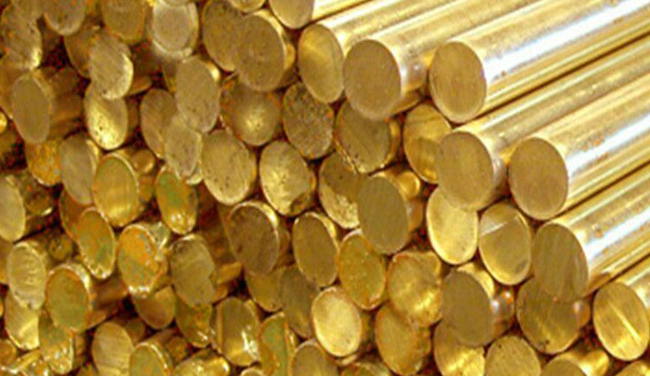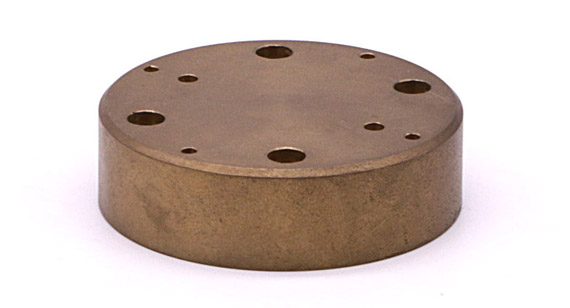15 years one-stop China custom CNC machining parts factory

Hey there I’m VMT Sam!
With 25 years of CNC machining experience we are committed to helping clients overcome 10000 complex part-processing challenges all to contribute to a better life through intelligent manufacturing. Contact us now
 484 |
Published by VMT at Jul 03 2024 | Reading Time:About 2 minutes
484 |
Published by VMT at Jul 03 2024 | Reading Time:About 2 minutes
In the field of CNC machined parts manufacturing, brass is a common metal material widely used for its excellent ductility, electrical conductivity, and corrosion resistance. However, questions about whether brass rusts, tarnishes, and how it behaves in different environments are frequently discussed within the industry. This article delves into these characteristics of brass from multiple perspectives, providing comprehensive and professional answers tailored to the practical applications in CNC machined parts manufacturing.
Brass, an alloy of copper and zinc, has distinct physical and chemical properties compared to pure copper or zinc. Importantly, brass does not contain iron, meaning it does not rust in the same way iron does (i.e., forming iron oxide). However, brass can undergo a chemical process called "oxidation" under certain conditions, leading to a change in surface color and the formation of a dark yellow or greenish oxide layer, often mistaken for rust.

Brass does not rust over time, but it can undergo oxidation. The rate of oxidation depends on several factors, including the alloy composition of the brass, environmental conditions (such as temperature, humidity, and oxygen levels), and the maintenance of the brass product. Generally, brass oxidation is a slow and manageable process that does not significantly affect its physical properties.
Brass is highly stable and typically does not tarnish. However, prolonged exposure to harsh environments or chemical substances (like detergents and bath soaps) can cause the brass surface to darken or dull. This is not true tarnishing but rather the formation of an oxide layer or deepening of its color. Proper maintenance and cleaning can restore the original luster of brass.
As mentioned, brass itself does not tarnish over time, but its surface may exhibit color changes due to oxidation. This process can be slowed or removed through regular maintenance and cleaning.
Brass does not rust in water, but prolonged immersion or exposure to humid environments can accelerate its oxidation process. This happens because water molecules and oxygen in the air facilitate the oxidation of the brass surface. However, this oxidation is not equivalent to rusting as seen in iron but results in a protective oxide layer.
Salt water mainly accelerates the oxidation of the brass surface. Pure salt water does not directly corrode brass, but under certain conditions (such as high temperature and humidity), salt water can form residues on the brass surface, indirectly leading to corrosion. Additionally, if the salt water contains acidic substances (like vinegar or lemon juice), it can exacerbate corrosion.
The term "100% brass" might be misleading since brass is inherently an alloy of copper and zinc. In this context, "pure brass" (i.e., a fixed-ratio brass alloy) does not rust but will undergo oxidation, forming an oxide layer.
The rate at which brass "rusts" (oxidizes) varies depending on several factors, including the brass alloy composition, environmental conditions, and maintenance practices. Under typical conditions, the oxidation rate of brass is relatively slow and does not significantly impact its lifespan.
Stainless steel has superior corrosion resistance due to its high chromium content, making it more resistant to oxidation than brass. Therefore, under the same environmental conditions, brass typically oxidizes faster than stainless steel. This does not imply brass is unsuitable for CNC machined parts but highlights the need for appropriate material selection based on specific application scenarios and requirements.
Does Brass Oxidize?
Brass does oxidize. As previously mentioned, brass reacts with oxygen and moisture in the air, forming a dark yellow oxide layer. This oxidation layer, although altering the appearance, does not significantly affect the physical properties of brass and can even protect it from further oxidation.

Preventing brass from oxidizing involves similar methods to preventing rust, including keeping it dry, regular cleaning, using polish, and applying sealants. Additionally, storing brass items in sealed containers or using dehumidifiers can reduce environmental moisture and slow oxidation.
Brass has a relatively low tendency to corrode but is not entirely corrosion-resistant. The corrosion resistance of brass depends largely on its alloy composition, particularly the zinc content. Generally, brass alloys with higher zinc content (such as common brass) are more prone to corrosion in humid or corrosive environments. However, adding other alloying elements (like tin, lead, or nickel) can significantly enhance brass's corrosion resistance, producing alloys like naval brass and high-tin brass for use in corrosive environments.
In CNC machined parts manufacturing, the choice of brass alloy depends on the specific application and environmental conditions. For parts exposed to corrosive environments or high humidity, manufacturers tend to choose brass alloys with higher corrosion resistance to ensure long-term stability and reliability.
The lifespan of brass metal is complex and influenced by various factors, including alloy composition, environmental conditions, usage, maintenance, and manufacturing processes. Therefore, it is difficult to provide a uniform answer for all brass products.
Generally, well-maintained brass products can have an extremely long lifespan. For example, some historical brass sculptures, decorative items, and architectural components remain intact after centuries. However, brass products may have a significantly shorter lifespan if subjected to harsh environments or improper use and maintenance.
To extend the lifespan of brass products, appropriate maintenance measures should be taken, such as keeping them dry, regular cleaning, avoiding contact with corrosive substances, etc. Additionally, during the design and manufacturing of brass products, careful consideration of the usage environment and conditions, selection of suitable brass alloys, and manufacturing processes are necessary to ensure excellent corrosion resistance and stability.
In summary, while brass does not rust (i.e., form iron oxide), it can oxidize and may be subject to corrosion. The rate of oxidation and corrosion depends on several factors, including the alloy composition, environmental conditions, and maintenance practices. In CNC machined parts manufacturing, selecting the appropriate brass alloy and manufacturing processes based on specific application scenarios and needs, and adopting proper maintenance measures, can extend the lifespan of brass products. By choosing and using brass materials wisely, we can provide reliable and cost-effective solutions for manufacturing precision parts.
Brass can indeed turn green under certain conditions. This is usually due to the brass surface oxide layer reacting with moisture and carbon dioxide in the air, forming basic copper carbonate (commonly known as patina). Patina appears green or bluish-green and is a common phenomenon in brass oxidation. While this change may alter the appearance of brass, it typically does not significantly affect its physical properties.
Which Metal Rusts the Fastest?
The rate at which metals rust depends on several factors, including the inherent properties of the metal, environmental conditions, and whether anti-corrosion measures are in place. Among common metal materials, pure iron is most susceptible to rusting due to its high reactivity. However, different metals may rust at different rates under the same conditions, and some alloys (such as stainless steel) have excellent corrosion resistance due to their unique compositions and structures. Therefore, comparing the rusting rates of different metals requires considering multiple factors.
Ready To Start Your Next Project?
Get Instant Quote

Request a Free Quote
Send us a message if you have any questions or request a quote. We will get back to you ASAP!